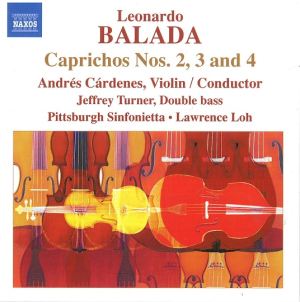 |
 |
|


alternatively
CD:
MDT
AmazonUK
AmazonUS
Sound Samples & Downloads
|
Leonardo BALADA (b.1933)
Caprichos No 2 (2004) [15:09]
Caprichos No 4 ‘Quasi Jazz’ (2007) [24:04]
Caprichos No 3 ‘Homenaje a las Brigadas Internacionales’ (2005) [24:58]
 Andrés Cárdenes, violin (No 2), Jeffrey Turner, double bass (No 4)
Andrés Cárdenes, violin (No 2), Jeffrey Turner, double bass (No 4)
Pittsburgh Sinfonietta/Andrés Cárdenes (Nos 2,4), Lawrence Loh (No 3)
rec. 27 September, 2009 (No 2), 16-27 May, 2008 (Nos 3-4), Kresge Recital Hall, Carnegie Mellon University, Pittsburgh, USA (No 2), Alumni Concert Hall, Carnegie Mellon University (Nos 3-4)
 NAXOS 8.572176 [64:11]
NAXOS 8.572176 [64:11] 
|
|
|
Years from now Leonardo Balada may well be remembered as one
of the most interesting composers of our time. That will be
in part because of his significant recorded legacy on Naxos,
but mostly due to the simple fact that he is one of the first
composers of our age to emerge from the corridors of theory
and write naturally. At least, that’s Balada’s own explanation
for his style, in the combative and clear booklet note, where
he draws a contrast between a time when theorists and musicologists
derived their ideas from pre-existing music, and the dawn of
Schoenberg, who (Balada says) was the first composer to draw
his style from the theory, rather than the other way around.
Balada himself was once a member of the avant-garde, with such
works as Guernica, but in recent decades has chosen to
let musicologists try to label his music for themselves. He
rejects the dichotomy between “abstract” and “folk-influenced”
music, and asserts that every composer ought to simply have
an individual style, which either works, or doesn’t. Listeners
who know his concertos and symphonies from earlier Naxos releases
will know that Leonardo Balada’s style does.
These Caprichos, or works for chamber orchestra, are as close
as Balada gets to “folk-influenced” music. No 2 is a trio of
sharply-cut takes on Latin dance rhythms, although these are
often hard to recognize underneath the sarcastic film of what
Balada calls “a free modernistic manner.” In some ways this
is the driest of the three works, and Balada himself seems to
think so, describing it only briefly in the booklet. The starring
roles are for violinist Andrés Cárdenes and harpist Gretchen
Van Hoesen, who gets some of the juiciest material in the outer
movements. Is there a hint of the “Mexican Hat Dance” in the
finale?
Capricho No 4, “Quasi Jazz,” is built around a virtuosic, tuneful
double bass solo part straight out of classic jazz albums. The
piano, clarinet and string accompanists are very skillfully
deployed around the soloist, avoiding the problems inherent
in choosing such a low-key instrument for the lead part. Listen,
especially, to the spiritual second movement, with the double
bass singing a sad number over motoric pizzicatos; that the
third movement continues the same mood at greater length is
a bit of a pity. Jeffrey Turner is the confident soloist with
a deep affinity for this music.
Capricho No 3 is presented last on the disc and that makes sense,
as it is - to me, at least - the most compelling work. Like
the other two works, the influences of Balada’s avant-garde
days and his gift for “spiking” tunes with emotional ambivalence
are always evident, but without the claims to folk styles which
do not always ring true. Moreover, the second movement (“In
memoriam”) features a gorgeous, lyrical violin solo that really
is quite moving. It might be the most simply-scored movement
on the disc, and benefits from that. The last two movements
are excellent, too, if very old-fashioned: a lament in the form
of a softly eloquent Irish folk song sung by violin against
a sophisticated - that is, “modern” - accompaniment and then
a really rousing jota in which Balada really frees himself of
his inhibitions.
The “Pittsburgh Sinfonietta” was explicitly formed to make this
recording, out of members of the Pittsburgh Symphony and Chamber
Orchestras, and Naxos has quite generously chosen to provide
photos and biographies of every soloist performer - all players
but the string orchestra. Andrés Cárdenes, the Pittsburgh Symphony’s
fantastic concertmaster - you can hear his violin solo work
in the Janowski/PentaTone Brahms Symphony No 1 - supplies confident,
glittering violin playing and, in two of the Caprichos, the
sure conducting of someone who knows and cares about the music.
Lawrence Loh takes up the baton in the Third Capricho with no
less satisfying results.
This might not be the best introduction to Balada’s music, since
many of the symphonies are more serious and quite a few of the
concertos are both highly accessible and dazzlingly written.
My favorite Balada disc is probably still the concerto album
conducted by José Serebrier, and my preference overall will
still run toward Balada’s full-orchestra music, though I suspect
he’d be a winner at string quartets. But those who know the
composer well and appreciate his output will definitely enjoy
this addition to Naxos’ continuing Balada series.
With every new disc, Leonardo Balada looks more and more like
one of our most outstanding composers. Or is it that he looks
more and more like one of my favorites? Either way, these Caprichos
show that even his “folk” side is well worth hearing.
Brian Reinhart
See also review by Byzantion
|
|















